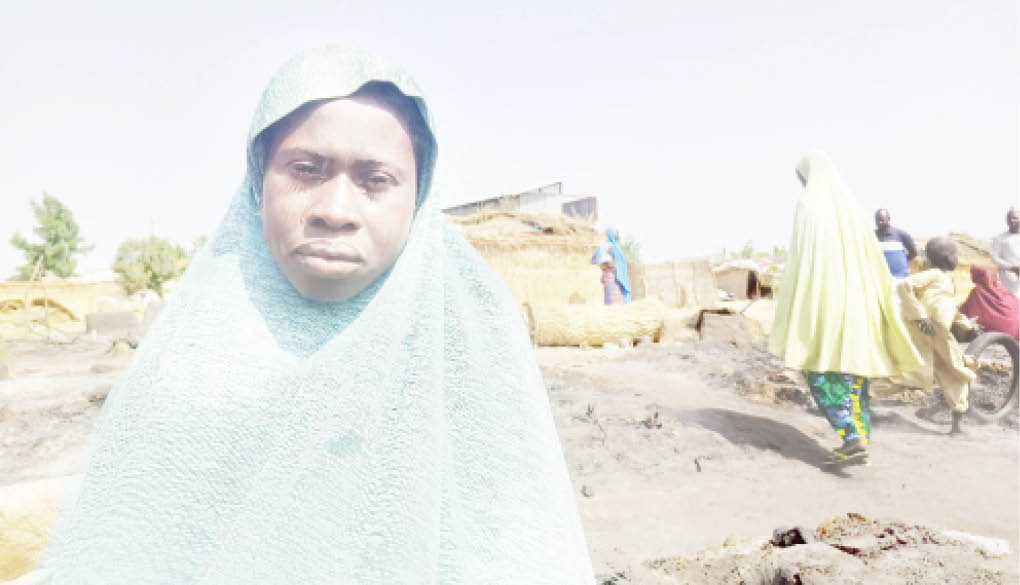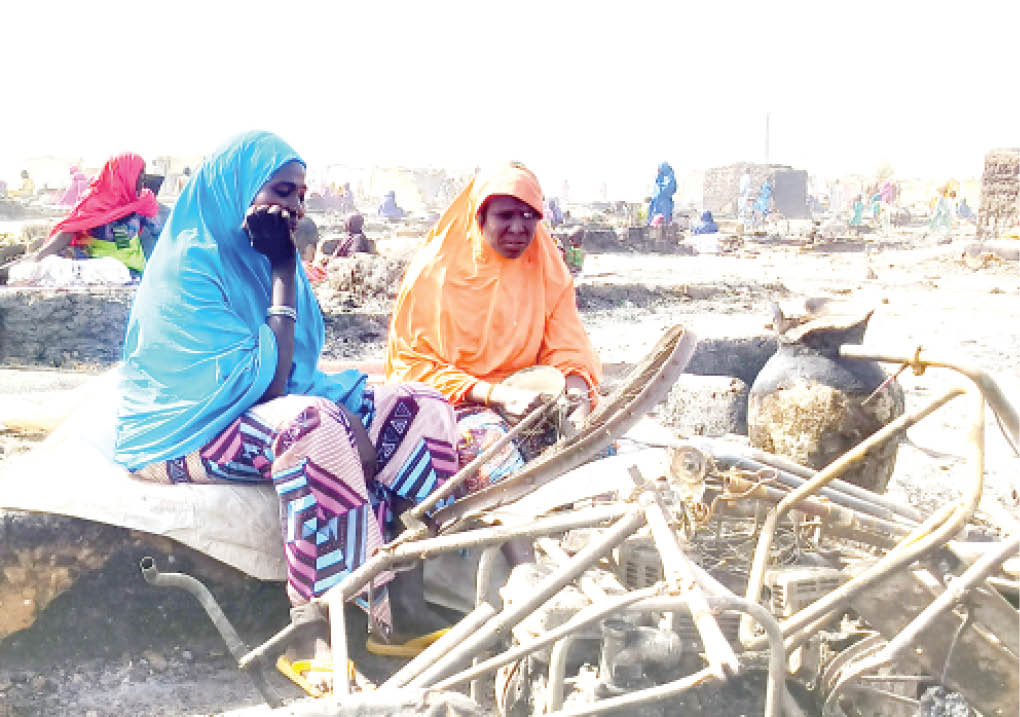Anguish as Borno IDP camp fire kills, destroys livelihoods
An inferno in Muna IDP camp in the Borno State capital, Maiduguri, took the lives of a 7-year-old girl and a 10-year-old boy, burnt their shelters and left their parents grieving in this season of intense harmattan cold without a home. Local security said the fire ripped through a section of the camp just before […]

Malama Amina lost her 10-year-old son
An inferno in Muna IDP camp in the Borno State capital, Maiduguri, took the lives of a 7-year-old girl and a 10-year-old boy, burnt their shelters and left their parents grieving in this season of intense harmattan cold without a home.
Local security said the fire ripped through a section of the camp just before 6pm, and snatched the lives of the little children while their mothers were out harvesting beans on a nearby farm.
The Director General of the State Emergency Management Agency (SEMA), Dr Barkindo Muhammad, confirmed both deaths from the fire disaster.
Upon their return, the mothers, Malama Amina and Hajja Zara, found that their children had succumbed to injuries from the fire and died on the spot.
While thousands of IDPs grieved over the loss of 1,113 thatched houses and belongings, these mothers had a sleepless night crying over the loss of their children.
2 killed, 1,000 houses lost as fire engulfs IDP camp in Borno
Tinubu returns to Abuja after Saudi, Guinea Bissau trips
Speaking to Daily Trust, the mother of the 7-year-old girl, Hajja Zara, said the death of her only daughter outweighed all the property she lost to the fire.
“For three weeks, I have not been going to the farm, but early on Wednesday morning, something told me to go and get something for the family. I left her sleeping in the room, only to come back and find her dead.

“It still appears as if I’m dreaming; I don’t know how to start, I have lost everything,” she said, crying.
Similarly, the mother of the 10-year-old boy, Amina, who had tears coursing down her cheeks, couldn’t respond to any questions when our correspondent approached her.
Her sister, Aisha, narrated how they had a sleepless night trying to console Amina over the incident.
“She keeps recalling the horror of the fire, blaming herself for leaving the boy and his brother alone in the room.
“She went to the farm to work and get some money; that’s why she left them home. But Allah had destined that to happen. So, we urge her to take solace,” she said.
She advised that the government should look into Amina’s condition and see how they can assist in easing the trauma she was suffering.
Some of the victims of the inferno said the fire was ignited by a flame from a stove a female IDP was cooking with in one of the thatched houses.
However, there is no official statement regarding the cause of the fire.
Children sleep in the open
As the bereaved mothers grieve over their deceased children, thousands of IDPs in the camp who lost everything to the inferno now sleep in the open, with nothing to cover their children.
Our correspondent, who arrived at the camp around 7:20am saw officials of the State Emergency Management Agency (SEMA) profiling households affected by the fire disaster.
In an interview with Daily Trust, many of the IDPs said they had not eaten as they couldn’t salvage any food from their burnt homes.
“We barely saved anything from the fire, so we all slept in the open despite the Harmattan wind, last night. You can see how our children are affected by the cold weather.
“Our major fear is the health issue, because these little children slept on mats on the ground without blankets.
“Also, as I’m talking to you now, none of my family members has had breakfast since morning. The children are crying because of hunger,” Bakura Gaji, one of the IDPs, said.
Another IDP, Modu Zarami, said all their clothes were burnt and they needed warm clothing for the children.
“Anybody who sees how we passed the night here will shed tears for these little children, because they were crying of cold and hunger throughout, and there’s nothing we can do.
“We couldn’t get intervention from the government last night until this afternoon,” he said.
IDPs’ goods, dry season farm produce burnt
Many IDPs in the camp said the fire burnt their food items, goods they traded in, and farm inputs they had secured in preparation for irrigation farming.
Aga Aisami, an irrigation farmer, said he bought fertiliser, seeds, and insecticide but has lost all to the inferno.
“All the inputs I saved for irrigation farming have been destroyed by fire. I lost my pumping machine, bicycle, and generator. We couldn’t remove anything from the house,” he said.
He appealed to the government to support him and the hundreds of households in the camp who had relied on irrigation farming to feed their families.
Garba Modu, who said he has two wives and 11 children, also said he was afraid of how to face life’s uncertainties after losing everything to the fire.
“Our major problem is not the clothes and food items that we lost, but our capital, as the items we sell are all burnt.
“Some of us here are farmers, some tailors, and our wives are into groundnut oil milling and cake making, but everything has been lost to the night fire. In fact, we don’t know where to start.
“Food assistance and skill acquisition training that we used to get in the past are no longer coming. We rely on what we saved all these years, and the fire disaster has taken everything away. We don’t know how to start now,” he said.
The Deputy Governor of Borno State, Umar Usman Kadafur, who represented Governor Umara Zulum, visited the camp and went round some of the burnt houses, where he condoled with those who were bereaved.
He also warned the IDPs against cooking near their huts, as most of their houses are made of thatch.
Kadafur, however, assured the IDPs that they would soon be relocated to their ancestral homes.
He kick-started the distribution of relief items provided by SEMA, which included maize flour, mattresses, blankets, cooking oil, seasonings and condiments.
The Director General of SEMA, Dr Barkindo Muhammad, said yesterday that immediate relief items of 1,200 15kg bags of maize flour, 1,200 mattresses and 1,200 buckets, as well as other non-food items, would be supplied to the IDPs to immediately alleviate their suffering.
Fire at Muna camp has become a yearly ritual, which happens at the onset of the harmattan, burning many houses across the about 7,000-capacity camp.
The camp, which originally used to be populated mainly by IDPs from Mafa, Matte, Dikwa, and Gamboru-Ngala LGA, is now also occupied by others from Nana and Gwoza, as well as returnees who could not stay at their ancestral homes after they were relocated following the closure of official camps by the Borno State Government.
